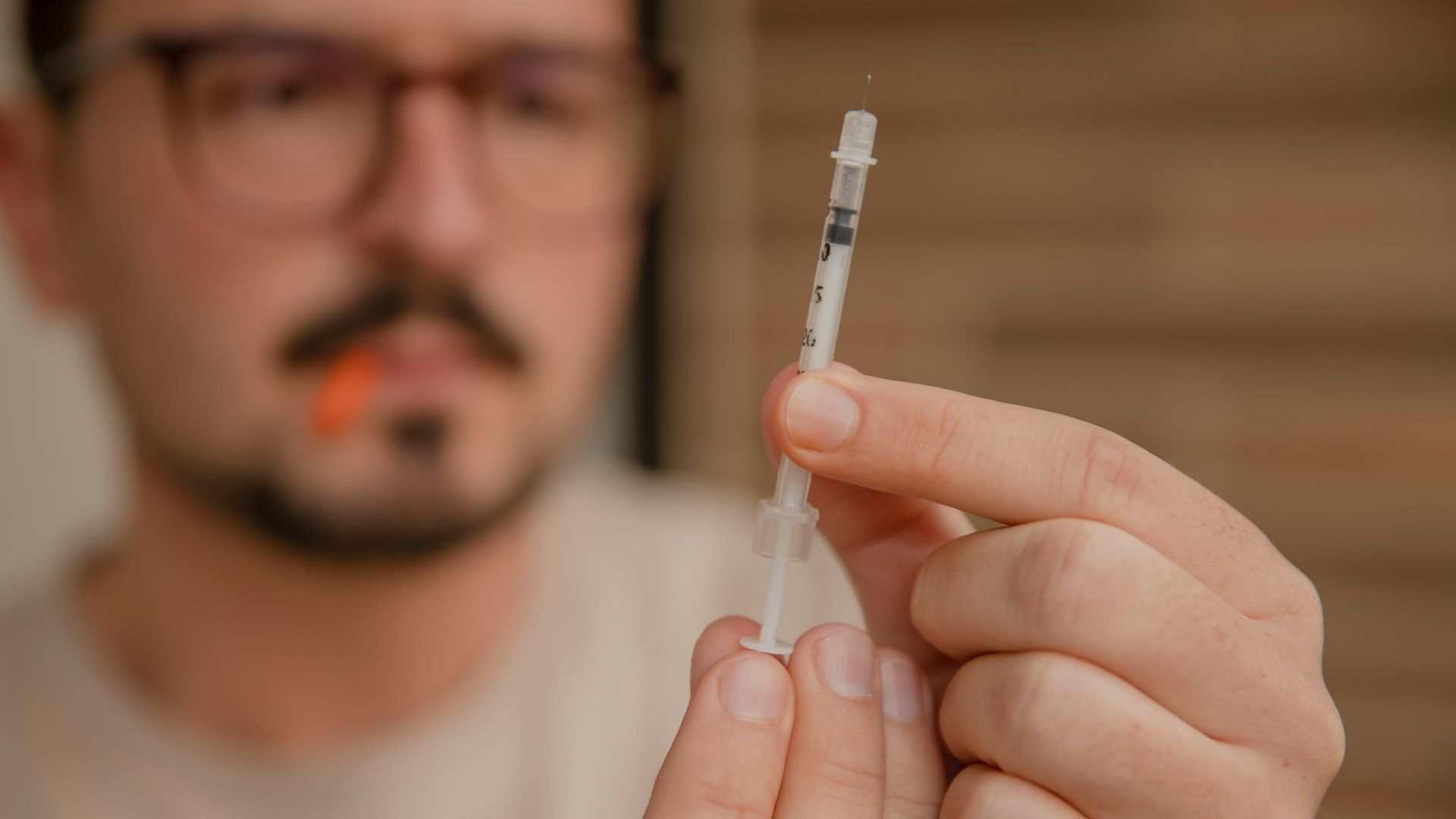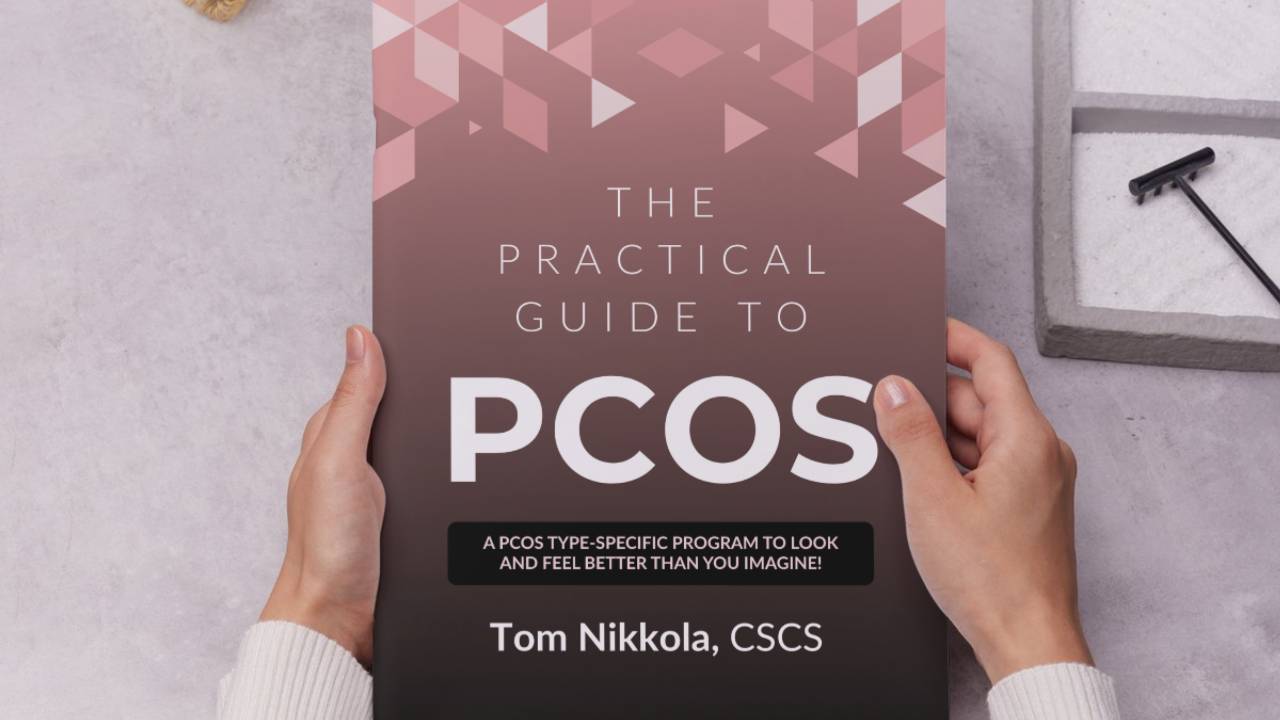
This is the most common cause of GLP-1 side effects
Oct 24, 2025It happens every week.
Someone DMs me about starting tirzepatide or semaglutide, excited, nervous, and ready for change.
They say, “Tom, I’ve been reading everything I can about GLP-1s…and I’m a little scared.”
They list every possible side effect they’ve seen on Reddit or in a Facebook group or heard on the news:
-
Nausea
-
Fatigue
-
Constipation
-
“Ozempic face” (whatever that actually means)
-
Brain fog
-
Hair loss
-
Existential dread (okay, maybe not that one, but close)
They "give it a try," expressing how nervous they are moments before they do their first injection. And then, sure enough, 10 minutes later, they start feeling all the symptoms they were worried about. On top of that, they start to believe everything else they're experiencing, from an itch on their scalp to a broken nail was from the shot they just gave themselves.
Meanwhile, other clients start the same peptides, same dose, same protocol…and feel amazing. More energy, better focus, calmer appetite, improved digestion.
Same molecule, two totally different experiences.
So what’s going on?
After now having worked with hundreds of people who've gotten their peptides through my recommended source, from their doctor, or even from sketchy online gray market retailers, I've seen an extremely consistent theme.
It’s not about biology.
It’s belief.
The Mind–Body Connection Is Real (and Measurable)
You’ve probably heard of the placebo effect...when someone takes a sugar pill but still gets better because they believe they will.
But most people don’t realize the opposite exists too: the nocebo effect...when your mind creates side effects because you expect them.
And it’s not a fringe idea. It’s one of the most studied and consistent findings in all of medicine.
For example:
-
In one major trial on statins (cholesterol-lowering meds), over half of participants who believed they’d have muscle pain actually developed it, even when they were given a placebo (I'm definitely not suggesting statins are a good idea...just making a point about the power of a placebo).
-
In chemotherapy research, 30% of patients lost their hair during placebo treatment.
-
In antidepressant studies, 25% of placebo users report side effects identical to the drug itself.
The brain is powerful.
It doesn’t just interpret what happens in the body. It can create physiological responses based purely on expectation.
When you think, “This drug will make me sick,” your brain obliges.
It alters digestion, triggers stress hormones, slows gut motility, even changes neurotransmitter balance.
Your belief becomes biology.
GLP-1s: The Most Misunderstood Breakthrough in Modern Medicine
Nowhere is the nocebo effect more visible than with GLP-1 medications like tirzepatide and semaglutide.
Because even though these peptides are incredibly safe, the internet has convinced millions of people to expect the worst.
If you Google “GLP-1 side effects,” you’ll get 20 million results before you finish typing. If you search “GLP-1 benefits”? Maybe a few thousand.
And most of the negative headlines? They’re written by journalists who’ve never opened a research paper in their lives.
They take rare, exaggerated anecdotes and spin them into viral fear:
“GLP-1s Cause Facial Wasting!”
“Stomach Paralysis from Ozempic!”
“Weight-Loss Drugs That Destroy Your Gut!”
There's even evidence that Big Pharma is behind much of the fear-mongering as they attempt to eliminate the opportunity to get peptides outside of their brand name products. Bringham Buhler explained this charade on a recent JRE podcast.
Sounds terrifying until you look at the actual data.
What the Research Actually Shows
Let’s cut through the noise.
When you review the peer-reviewed studies on semaglutide and tirzepatide, the safety data is remarkably consistent and boring, in the best possible way.
And remember, these stats are at the standard weight loss doses, not microdoses, which would be even more rare.
✅ Nausea: The most common side effect, reported in 10–15% of participants during initial titration. It almost always resolves after a few weeks.
✅ Constipation: Typically mild and temporary. Easily fixed with hydration, magnesium, and fiber.
✅ Gallbladder issues: Extremely rare (less than 0.5%), usually related to rapid weight loss, not the medication itself.
✅ Serious adverse events: Practically nonexistent compared to any other class of drugs prescribed at this scale.
No liver toxicity.
No organ damage.
No systemic inflammation.
No hidden dangers.
And here’s the kicker:
In long-term trials (over 2 years), participants on GLP-1s had lower overall mortality, fewer cardiac events, and better brain function than the placebo group.
So when people tell me they’re afraid of the side effects, I always think, statistically, they should be more afraid of not using it.
So Why Does Fear Create “Side Effects”?
Because anxiety, panic, and stress physically change how your body digests, metabolizes, and responds to medications.
When you start a peptide in a state of fear, your nervous system shifts into fight-or-flight mode.
Your cortisol and adrenaline spike. Your gut slows down. Your stomach acid drops.
That means even a microdose of tirzepatide can feel “off” because your digestion and blood sugar are already being thrown off by stress hormones.
It’s not that the peptide is harming you, it’s that your body is too busy reacting to your anticipation of harm.
And this creates a self-reinforcing loop:
-
You feel nervous before dosing.
-
Your gut tightens and your heart rate goes up.
-
You interpret that as a “reaction” to the peptide.
-
Your brain flags the experience as “danger.”
-
The next time, the response happens faster and stronger.
You’ve essentially conditioned yourself into side effects.
But Here’s the Flip Side: The Placebo Power Works Both Ways
If fear can create negative symptoms, confidence can amplify positive ones.
That’s not “woo-woo” psychology, it’s neuroscience.
Belief and expectation modulate neurotransmitters like dopamine, serotonin, and GABA.
When you approach something with curiosity, hope, or excitement, your body literally becomes more adaptive.
Blood flow improves.
Digestive enzymes increase.
Stress hormones drop.
Cellular response improves.
So when people start tirzepatide or semaglutide with a mindset of “I’m about to feel incredible”, their body leans into that response.
And most of the time, they do!
That doesn't mean that all the benefits are placebo effects. If they were, the research wouldn't haven't supported their use. That's what research typically does...identify whether there's a benefit or just a placebo effect from a treatment.
The Media Primed You to Fear What Could Save You
Let’s be honest: fear sells better than facts.
So the media didn’t tell you about the hundreds of studies showing how GLP-1s improve:
-
Insulin sensitivity and metabolic flexibility
-
Brain health, reducing risk of Alzheimer’s and cognitive decline
-
Heart health, lowering blood pressure and improving lipid profiles
-
Inflammation, by reducing cytokine overactivation
-
PCOS and hormone regulation, improving ovulation and fertility
-
Mast cell and histamine balance, calming the immune system (especially relevant for MCAS sufferers)
Instead, they cherry-picked outliers and exaggerated them for clicks.
Now millions of people are terrified of one of the safest and most beneficial medical advances of our lifetime, while still drinking alcohol, eating seed oils, and scrolling themselves into anxiety every night before bed.
Perspective matters.
Microdosing: The Safe, Smarter Way to Use GLP-1s
If you’re still nervous, here’s the great news: you don’t need to go full throttle.
Microdosing GLP-1s, starting with a fraction of the clinical dose, is a powerful way to get all the benefits with almost zero risk.
Small, consistent doses support:
-
Appetite regulation without nausea
-
Blood sugar stability throughout the day
-
Gut motility and microbiome balance
-
Neuroinflammation reduction (hello, mental clarity)
-
Cellular repair and mitochondrial efficiency
And for people already living healthy lifestyles, eating clean, strength training, managing stress, this approach turns GLP-1s into one of the best longevity tools available.
If You Want a Better Experience, Change the Story
The next time you take your injection, pay attention to the story in your head.
Instead of thinking, “I hope this doesn’t make me nauseous,” think, “This is going to help my body work better.”
Or, you can take the approach I do whenever I start a new supplement or therapy: indifference.
I have no expectation something will work or not work for me, and no expectation I'll have a side effect either. I just go into it with curiosity based on the research I've read, and wonder if it'll do anything for me.
That way, I have no expectation of help or harm.
It sounds simple, but your brain listens.
If you feed it fear, it’ll give you symptoms.
If you feed it trust, it’ll give you results.
Because your body isn’t your enemy. It’s responding to the signals you send it, every thought, every emotion, every expectation.
And when you pair that mindset with something as safe, effective, and transformative as tirzepatide or semaglutide (especially when sourced through trusted platforms like EllieMD), you’re stacking the deck in your favor.
The Takeaway
Most “side effects” people experience with GLP-1s aren’t from the peptides.
They’re from the stories they’ve been told and the ones they tell themselves.
The research is clear: tirzepatide and semaglutide are safe, effective, and beneficial for far more than weight loss.
Are they "zero risk?" Of course not. Nothing is.
They improve blood sugar, reduce inflammation, sharpen cognition, enhance gut function, and support long-term metabolic health.
But if your mind is already playing defense, your body can’t play offense.
So if you’ve been hesitant, anxious, or scared, remember this:
Your body is listening to your beliefs. And it’s capable of far more than fear will ever let you see.
Start small. Stay consistent.
And if you’re ready to try it safely, the right way, through pharmacy-grade peptides, you can do that here:
Your future self, calm, focused, leaner, and metabolically resilient, will thank you.
And with all this said, I'm sure someone who's reading this will get upset because they did have a legit side effect.
It happens with everything. If it happened to you, there's something else that's out there that'll work. It just doesn't make sense to warn everyone else to stay away from something that could significantly benefit them.
That would be like me warning everyone to stay away from mountain biking because I broke my neck. How many others would miss the joy and health that comes from riding if I convinced them it was way too risky?





